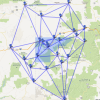Science & Technology
 <p>The Howard Hughes Medical Institute has awarded the University of Colorado Boulder $1.5 million over five years to continue to transform science education by encouraging more real-world research experiences for undergraduates, ranging from cancer studies to screenings for new antibiotics.</p>
<p>The Howard Hughes Medical Institute has awarded the University of Colorado Boulder $1.5 million over five years to continue to transform science education by encouraging more real-world research experiences for undergraduates, ranging from cancer studies to screenings for new antibiotics.</p>- <p>Scientists armed with a supercomputer and a vast trove of newly collected data on the body’s most potent “tumor suppressor” gene have created the best map yet of how the gene works, an accomplishment that could lead to new techniques for fighting cancers, which are adept at disabling the gene in order to thrive.</p>
 <p>On May 22, Jet Propulsion Laboratory (JPL) Director Charles Elachi and his senior management team met with University of Colorado Boulder Chancellor Philip P. DiStefano and several other campus administrators to sign a memorandum of understanding to continue and broaden a rich tradition of collaboration on space and Earth-science efforts going back nearly 50 years. Located in Pasadena, Calif., JPL is a federally funded research and development facility managed by the California Institute of Technology for NASA.</p>
<p>On May 22, Jet Propulsion Laboratory (JPL) Director Charles Elachi and his senior management team met with University of Colorado Boulder Chancellor Philip P. DiStefano and several other campus administrators to sign a memorandum of understanding to continue and broaden a rich tradition of collaboration on space and Earth-science efforts going back nearly 50 years. Located in Pasadena, Calif., JPL is a federally funded research and development facility managed by the California Institute of Technology for NASA.</p>- <p>Jet Propulsion Laboratory Director Charles Elachi and his senior management team will be on the University of Colorado Boulder campus May 22 to sign a memorandum of understanding with top university officials to continue and broaden a rich tradition of collaboration on space and Earth-science efforts going back nearly 50 years.</p>
<p>Elachi will sign the MOU May 22 with CU-Boulder Chancellor Philip P. DiStefano. Located in Pasadena, Calif., JPL is a federally funded research and development facility managed by the California Institute of Technology for NASA.</p>  <p>Individuals are more genetically similar to their spouses than they are to randomly selected individuals from the same population, according to a new study from the University of Colorado Boulder.</p>
<p>Individuals are more genetically similar to their spouses than they are to randomly selected individuals from the same population, according to a new study from the University of Colorado Boulder.</p> <p>A University of Colorado Boulder physiology laboratory conducting research to improve locomotion for lower limb amputees, including military service veterans, is being featured nationally as part of 2014 Veterans Affairs Research Week May 19-23.</p>
<p>A University of Colorado Boulder physiology laboratory conducting research to improve locomotion for lower limb amputees, including military service veterans, is being featured nationally as part of 2014 Veterans Affairs Research Week May 19-23.</p> <p>During two days of intensive airborne measurements, oil and gas operations in Colorado’s Front Range leaked nearly three times as much methane, a greenhouse gas, as predicted based on inventory estimates, and seven times as much benzene, a regulated air toxic. Emissions of other chemicals that contribute to summertime ozone pollution were about twice as high as estimates, according to the new paper, accepted for publication in the <a href="http://sites.agu.org/">American Geophysical Union</a>’s <em><a href="http://onlinelibrary.wiley.com/journal/10.1002/%28ISSN%292169-8996">Journal of Geophysical Research: Atmospheres</a></em>.</p>
<p>During two days of intensive airborne measurements, oil and gas operations in Colorado’s Front Range leaked nearly three times as much methane, a greenhouse gas, as predicted based on inventory estimates, and seven times as much benzene, a regulated air toxic. Emissions of other chemicals that contribute to summertime ozone pollution were about twice as high as estimates, according to the new paper, accepted for publication in the <a href="http://sites.agu.org/">American Geophysical Union</a>’s <em><a href="http://onlinelibrary.wiley.com/journal/10.1002/%28ISSN%292169-8996">Journal of Geophysical Research: Atmospheres</a></em>.</p> <p>A University of Colorado Boulder professor who developed a clever method to measure snow depth using GPS signals is collaborating with Western Slope officials to make the data freely available to a variety of users on a daily basis.</p>
<p>A University of Colorado Boulder professor who developed a clever method to measure snow depth using GPS signals is collaborating with Western Slope officials to make the data freely available to a variety of users on a daily basis.</p>- <p>An antioxidant that targets specific cell structures—mitochondria—may be able to reverse some of the negative effects of aging on arteries, reducing the risk of heart disease, according to a new study by the University of Colorado Boulder.</p>
<p>When the research team gave old mice—the equivalent of 70- to 80-year-old humans—water containing an antioxidant known as MitoQ for four weeks, their arteries functioned as well as the arteries of mice with an equivalent human age of just 25 to 35 years.</p> - <p>The University of Colorado Boulder today launched CU-Boulder Crowdfunding, an online pilot platform to help drive the ideas generated by students, faculty and staff.</p>
<p>Crowdfunding is the practice of sourcing small contributions from a large number of people to provide funding for a particular project or campaign, usually via the Internet.</p>


